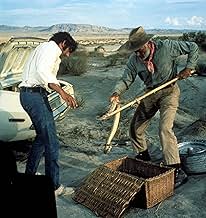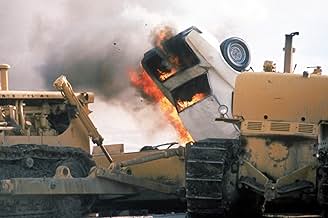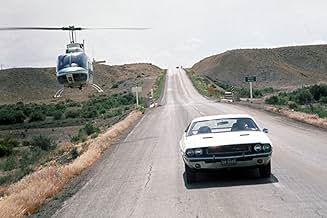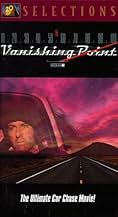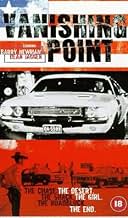During the 1970s, car-delivery driver Kowalski delivers hot rods in record time, but always runs into trouble.During the 1970s, car-delivery driver Kowalski delivers hot rods in record time, but always runs into trouble.During the 1970s, car-delivery driver Kowalski delivers hot rods in record time, but always runs into trouble.
- Director
- Writers
- Stars
- Awards
- 1 nomination total
Charlotte Rampling
- Hitch-Hiker
- (scenes deleted)
Robert Donner
- Deputy Collins
- (as Bob Donner)
- Director
- Writers
- All cast & crew
- Production, box office & more at IMDbPro
Featured reviews
Many people don't know where the radio d.j. was broadcasting from in the movie. He was broadcasting from the then closed Goldfield Hotel, in beautiful "downtown" Goldfield Nevada! I should know! I was a resident in this picturesque little town of 110 people (in 1971). The Goldfield Hotel has since found new life as a restored historical landmark. The town itself has surged in population due to new mining processes, and the re-opening of the long closed mines. During the movie, a scene picturing the front of the "Green Frog Market", you will see the faint glow of a freckle-faced, red headed little boy, gazing out of the window......yeah..it's me!! This movie was quite exciting in a town of 110 people!
"Vanishing Point" asks the question and, like other films of this kind before "Smokey & the Bandit" brought the genre to an end, lets us ponder the answer on our own. Other than that, there's no point to this film except to demonstrate that the Challenger is one of the best-looking muscle/sports cars ever made. Get too far into this movie & you'll want to sell your children to have one. Kowalski is a '70s knight-errant, or a Greek mythological hero, just as you please. He rides his Hemi-powered steed on a quest to San Francisco, not for a "what," or a "why," or even for a lady fair, but only for "how fast." Does he seek redemption? Escape? Self-forgiveness? To stick it to the Man? Who cares? Knavish cops close in on him, lotus-eaters like Hovah (Darden) shun him, sirens (especially the stark-naked Texter, who would've stopped Burt Reynolds's Bandit faster than Sally Field ever did) want him to dally. Sharp-featured, Western character actor Anthony James has a hilarious, uncharacteristic turn as a gay hitchhiker. Humble, noble souls come forth to guide Kowalski like angels, including a scruffy snake-hunter (Jagger), chopper jockey & drug dealer Angel (Scott), and the blind deejay Super Soul (Little, who should've been a contender for the part of Howard Beal in "Network"). The Man's attempts to explain Kowalski are annoying distractions, so hit the "mute" button when you see scenes of cops in offices. And stop wondering why Kowalski, on his quest for speed, is always being overtaken & passed by other vehicles. Just put your brain in neutral, put your popcorn where it's handy, and buckle up.
Kowalski transports cars across the western US in 1970. He gets a gig transporting a 1970 Dodge Challenger R/T from Denver to San Francisco and sets out at maximum warp, stopping only for gas and strategy. He commits no crime outside of speeding, and fleeing the cops who are trying to stop him simply because he will not stop. He finds allies along the way, including an old prospector, a DJ named Super Soul, and a hippie who seems to me to be an alternate ending to the life of Peter Fonda's character Wyatt in "Easy Rider". He drives and drives and drives until he meets his destiny in a tiny town on the California-Nevada border at 10:04 AM on some unnamed Sunday.
Why? Is it because of his past; ex-cop, ex-racer, tragically bereaved? Is it because of the truckload of speed he takes at the beginning of the movie (draw your own metaphors between Kowalski's internal use of the noun and external use of the verb)?
Or is it the road, the infinite expanses of the Southwest, the silence, the freedom, the sound of the motor surging, the tires spinning, the wheels gobbling up and sitting out the black asphalt? Who knows? Kowalski seems indifferent as to why he drives, only that he must drive, must evade, must get to where he is going and will not - can not - be stopped.
Do yourself a favor. Rent the original, don't see the '97 made for TV movie (it has some high points, but it's like watching the '99 "Psycho" before seeing the Alfred Hitchcock original). In fact, rent this and "Two Lane Blacktop" from Monte Hellman, and "Mad Max" and/or "The Road Warrior". Watch all of them in as close to one sitting as you can get.
If after watching these movies, you don't understand how they're expressions of the same call to the open road, return them and give up. Not everyone was meant to hear it, just like not everyone has perfect pitch or the ability to wiggle their ears.
This movie drove me (pun intended) to take the handle kowalski and buy a Challenger of my own (flame red, 1973, you see the 1970 R/Ts are very hard to get).
It probably won't do the same for you, but if you've ever been driving down the open road and wondered what would happen if you _didn't_ get off at the next exchange, in fact if you never got off at all, then this film is for you.
And I hope the next ignoramus who compares this masterful film to "The Dukes of Hazzard" loses his brakes and plows into a line of parked Harleys outside some bar with a name like Whiskey Junction or the Dew Drop Inn.
Why? Is it because of his past; ex-cop, ex-racer, tragically bereaved? Is it because of the truckload of speed he takes at the beginning of the movie (draw your own metaphors between Kowalski's internal use of the noun and external use of the verb)?
Or is it the road, the infinite expanses of the Southwest, the silence, the freedom, the sound of the motor surging, the tires spinning, the wheels gobbling up and sitting out the black asphalt? Who knows? Kowalski seems indifferent as to why he drives, only that he must drive, must evade, must get to where he is going and will not - can not - be stopped.
Do yourself a favor. Rent the original, don't see the '97 made for TV movie (it has some high points, but it's like watching the '99 "Psycho" before seeing the Alfred Hitchcock original). In fact, rent this and "Two Lane Blacktop" from Monte Hellman, and "Mad Max" and/or "The Road Warrior". Watch all of them in as close to one sitting as you can get.
If after watching these movies, you don't understand how they're expressions of the same call to the open road, return them and give up. Not everyone was meant to hear it, just like not everyone has perfect pitch or the ability to wiggle their ears.
This movie drove me (pun intended) to take the handle kowalski and buy a Challenger of my own (flame red, 1973, you see the 1970 R/Ts are very hard to get).
It probably won't do the same for you, but if you've ever been driving down the open road and wondered what would happen if you _didn't_ get off at the next exchange, in fact if you never got off at all, then this film is for you.
And I hope the next ignoramus who compares this masterful film to "The Dukes of Hazzard" loses his brakes and plows into a line of parked Harleys outside some bar with a name like Whiskey Junction or the Dew Drop Inn.
This is the essential 1970s anti-hero movie. It is not supposed to make sense and I have often wondered if it were not meant to be someone's psychedelic dream. Nudity when nudity would not seem to fit; bad cops; beaten people out of sync with plot line. Sounds like a trip. The cast is excellent and this is one of Cleavon Little's last main roles as well as the last main role for the early love interest. John Amos is so underplayed he is almost unrecognizable, I'd love to see his commentary on the movie. And one guy is so ripping off James Dean (though as a racist) that it is unintentionally funny. I'd recommend it as an addition to any American tape library. A true cult classic.
Vanishing Point is a difficult film to assess in many ways. As a movie, it is quite flawed. The plot is obvious but ultimately quite shallow - centering around Kowalski trying to deliver a car across the country in record time. Kowalski's back story is hinted at, which makes the film a bit more interesting, but his back story takes up only a few minutes of the film.
The characters and performances are often vacuous, failing to leave an impression. Barry Newman is the chief culprit, turning in a most colourless, emotionless performance where he personally offers little insight into his character. The exception is Cleavon Little as the hyperactive DJ Super-Soul; his interplay with Newman is novel, some of his dialogue is memorable (indeed, his rambling about Kowalski and the 'police Nazis' was quoted by Axl Rose of Guns N' Roses twenty years later) and his input gives the film some badly needed impetus.
Luckily though, Vanishing Point works better on other levels. For instance, it has that early 1970's style that makes the film more compelling than it should be. Newman is chiefly responsible for this; he is certainly emotionless, but that allows him to develop an air of 'cool' that suits the film. The white Dodge Challenger is a very nice touch.
The early 70's style also allows it to work as a period piece; Kowalski encounters counter-culture hippies, religious fanatics in the desert and the police. The fractious state of race relations between blacks and whites at that time is also highlighted. On the downside, it does substantially date the film. It's a cult classic for a reason; as the failed 1997 remake demonstrated, a movie like Vanishing Point would not work nearly as well in another era.
It also works reasonably well as a straight driving film. The film is punctuated with enough car crashes and chases to move the film forward.
However, the film's real saving grace is in its many allegories. The largely empty plot does ironically enable this, because you can read whatever you want into the film. I therefore understand why the plot is so empty, because the many allegories punctuated within the film make it intriguing to watch. For instance, why did Kowalski's face shine towards the end? Why were there so many STOP signs? Was Super-Soul a spiritual guide to Kowalski? You can also have fun inventing allegories that weren't even intended - why was the Dodge Challenger white, for example?
Ultimately, Vanishing Point is not the easiest film to assess. In conventional terms, I would not rank the film particularly highly because the plot, characters, acting and dialogue are often unimpressive. As such, the casual movie viewer may not particularly identify with it. However, Vanishing Point is not a particularly conventional film; like most good films it moves itself forward well, but it is the film's style and allegorical nature that largely keeps the interest and pushes the film above the ruck of many other driving movies. I also admit that the film could not have been as effective as an allegory if the plot wasn't so insubstantial. With this in mind, I have decided to give it:
3.5/5 stars
The characters and performances are often vacuous, failing to leave an impression. Barry Newman is the chief culprit, turning in a most colourless, emotionless performance where he personally offers little insight into his character. The exception is Cleavon Little as the hyperactive DJ Super-Soul; his interplay with Newman is novel, some of his dialogue is memorable (indeed, his rambling about Kowalski and the 'police Nazis' was quoted by Axl Rose of Guns N' Roses twenty years later) and his input gives the film some badly needed impetus.
Luckily though, Vanishing Point works better on other levels. For instance, it has that early 1970's style that makes the film more compelling than it should be. Newman is chiefly responsible for this; he is certainly emotionless, but that allows him to develop an air of 'cool' that suits the film. The white Dodge Challenger is a very nice touch.
The early 70's style also allows it to work as a period piece; Kowalski encounters counter-culture hippies, religious fanatics in the desert and the police. The fractious state of race relations between blacks and whites at that time is also highlighted. On the downside, it does substantially date the film. It's a cult classic for a reason; as the failed 1997 remake demonstrated, a movie like Vanishing Point would not work nearly as well in another era.
It also works reasonably well as a straight driving film. The film is punctuated with enough car crashes and chases to move the film forward.
However, the film's real saving grace is in its many allegories. The largely empty plot does ironically enable this, because you can read whatever you want into the film. I therefore understand why the plot is so empty, because the many allegories punctuated within the film make it intriguing to watch. For instance, why did Kowalski's face shine towards the end? Why were there so many STOP signs? Was Super-Soul a spiritual guide to Kowalski? You can also have fun inventing allegories that weren't even intended - why was the Dodge Challenger white, for example?
Ultimately, Vanishing Point is not the easiest film to assess. In conventional terms, I would not rank the film particularly highly because the plot, characters, acting and dialogue are often unimpressive. As such, the casual movie viewer may not particularly identify with it. However, Vanishing Point is not a particularly conventional film; like most good films it moves itself forward well, but it is the film's style and allegorical nature that largely keeps the interest and pushes the film above the ruck of many other driving movies. I also admit that the film could not have been as effective as an allegory if the plot wasn't so insubstantial. With this in mind, I have decided to give it:
3.5/5 stars
Did you know
- TriviaIn an interview, actor Paul Koslo spoke about legendary stunt driver Cary Loftin; "One night coming home from location, Cary was driving one of the Challengers back to the hotel, and he passed some New Mexico state troopers going 145 miles an hour! [laughs] He had four or five cop cars behind him with their lights on, but they couldn't catch up because they could only go about 125! So he drove into this little town and started to shut the car down. He pulled into a gas station, and I swear to God, he did a 360 in between the pumps and put the rear of the car - the gas tank - right in front of the super pump! He got out of the car like nothing happened, and the troopers busted his ass right there! [laughs] Oh, you should've seen those cops! They were fuming! They took him in, and the producer had to explain to them that Cary had actually been testing the car - that he did a lot of these spinouts because he'd been having trouble with the car! [laughs] I mean, you do have to test the cars, but you don't do it while you're driving home!"
- GoofsThe 19-inch racks in Super Soul's radio station with large tape reels (in one scene seen fast moving) are not audio equipment. These tape drives were used in computer systems in the 1970s to store data on tape.
- Quotes
Super Soul: This radio station was named Kowalski, in honour of the last American hero to whom speed means freedom of the soul. The question is not when's he gonna stop, but who is gonna stop him.
- Crazy creditsThe Fox logo is shown without the fanfare making it one of the first times this has happened.
- Alternate versionsWhen first released in Brazil, the movie had some scenes cut, reducing the running time to 99 minutes.
- SoundtracksYou Got to Believe
Composed by Delaney Bramlett
Sung by Delaney & Bonnie & Friends
(Courtesy of Atlantic Records)
Details
- Release date
- Country of origin
- Language
- Also known as
- Carrera contra el destino
- Filming locations
- Goldfield Hotel, Goldfield, Nevada, USA(KOW radio station)
- Production company
- See more company credits at IMDbPro
Box office
- Budget
- $1,585,000 (estimated)
- Gross US & Canada
- $12,442,673
- Gross worldwide
- $12,444,315
- Runtime
- 1h 39m(99 min)
- Color
- Aspect ratio
- 1.85 : 1
Contribute to this page
Suggest an edit or add missing content


